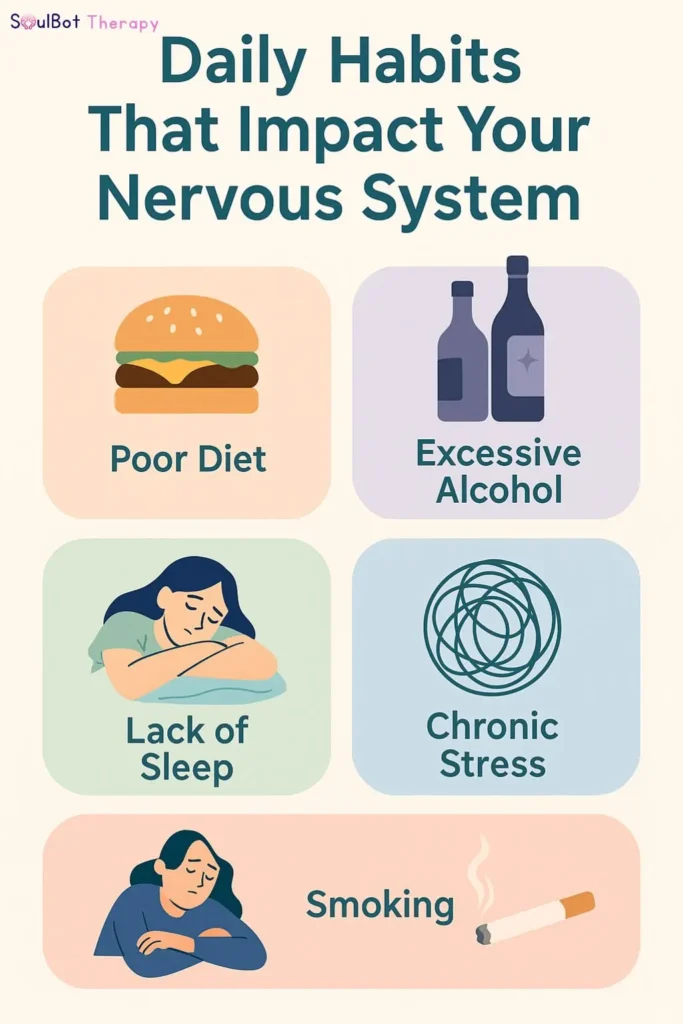Have you ever noticed your body reacting before your mind even has time to process what’s happening? Maybe your heart starts racing during an argument or your stomach tightens before a big presentation. That’s your nervous system, the body’s internal alarm, stepping in to protect you.
But when stress becomes constant, this system can stay “switched on,” leaving you anxious, tense, and emotionally drained. The good news? You can regulate your nervous system and help your body return to a state of calm and balance. In this guide, we’ll explore how stress impacts your nervous system, why regulation matters, and simple yet powerful stress regulation techniques you can start using today.
📌 Take the Love Language Test to enhance self-awareness, foster more profound connection, and support nervous system regulation during stressful times. 🧠 Why Does Stress Affect the Nervous System?
Think of your nervous system as the control centre of your body, constantly scanning your environment for safety or threat.
It’s made up of two key parts:
✦ Sympathetic Nervous System (SNS): Triggers your “fight, flight, or freeze” response. Heart rate increases, muscles tighten, and adrenaline floods your system.
✦ Parasympathetic Nervous System (PNS): Activates “rest and digest” mode, your body’s natural recovery phase.
When stress hits, your SNS takes over. Ideally, your PNS should help you recover once the threat passes. But chronic stress, like work pressure, emotional strain, or unresolved trauma, keeps the SNS active for too long, causing an imbalance.
This imbalance can manifest as:
- ➔ Persistent anxiety or irritability
- ➔ Sleep disturbances
- ➔ Digestive issues
- ➔ Fatigue or burnout
- ➔ Brain fog or memory lapses
Over time, this constant alert state prevents your body from resetting naturally. That’s where nervous system regulation comes in, helping you bring your body back to equilibrium.
💡 SoulTip: Your body isn't your enemy during stress; it's trying to protect you. Regulation is about teaching it that you're safe again.
What Does It Mean to Regulate the Nervous System?
To regulate your nervous system means guiding your body out of the stress response and into a state of calm awareness.
It’s not about eliminating stress, that’s impossible, but about training your body to move fluidly between activation (stress) and relaxation (recovery).
When your nervous system is regulated, you:
✔ Feel calmer and more grounded
✔ Think clearly even under pressure
✔ React consciously instead of impulsively
✔ Sleep better and digest more efficiently
✔ Experience fewer emotional highs and lows
A regulated nervous system doesn’t mean you never feel anxious. It means you can experience stress without getting stuck in it.
❓ Ready to bring calm back into your body and mind? Chat with SoulBot for personalized tips to regulate your nervous system effortlessly. 
🌸 Signs Your Nervous System Needs a Reset
Sometimes, your body sends signals before your mind catches up. These are signs that you might need a nervous system reset:
- You wake up feeling anxious for no apparent reason.
- You find it hard to relax even in peaceful moments.
- You’re easily startled or overwhelmed.
- Your breathing feels shallow or tight.
- You rely on constant distraction (phone, caffeine, work) to cope.
SoulFact: Awareness is the beginning of regulation. The moment you notice tension, you're already halfway to releasing it.
🌿 What Are the Best Stress Regulation Techniques?
When life feels heavy, simple daily practices can help restore balance. Here are science-backed stress regulation techniques to help calm your body and mind:
1. Breathwork: Your Built-In Reset Button
Your breath is the fastest way to access your nervous system.
Try:
- Box Breathing (4-4-4-4): Inhale for 4 counts, hold for 4, exhale for 4, and hold again.
- 4-7-8 Breathing: Inhale 4, hold 7, exhale 8. It activates your parasympathetic response.
- Physiological Sigh: Two quick inhales through the nose, one long exhale through the mouth, proven to reduce stress instantly.
2. Grounding for Anxiety
When stress pulls you into overthinking, grounding helps anchor you back in the present.
Try the 5-4-3-2-1 Method:
- 5 things you can see
- 4 things you can touch
- 3 things you can hear
- 2 things you can smell
- 1 thing you can taste
This simple exercise re-engages your senses and reduces anxiety.
🌱 Grounding for anxiety works because it shifts your focus from fear to sensory safety.
🤔 Did you know? The CDC highlights that learning to cope with stress through relaxation, grounding, and connection practices improves emotional stability and physical well-being.
3. Movement and Somatic Release
Physical movement helps discharge trapped stress energy. Whether it’s yoga, a brisk walk, or shaking out your limbs for 60 seconds, movement tells your body the threat is over.
Even light stretching or dancing in your room helps release stored tension.
4. Mindfulness and Meditation
Mindfulness trains your awareness. By observing thoughts and emotions without judgment, you reduce reactivity and strengthen emotional balance.
Try a short body scan meditation and notice sensations from your head to your toes, breathing into areas that feel tense. Over time, mindfulness builds resilience by lowering cortisol (the stress hormone).
5. Cold Exposure or Deep Relaxation
Cold showers, ice baths, or even splashing cold water on your face stimulate the vagus nerve, activating your relaxation response.
Alternatively, practices like progressive muscle relaxation or yoga nidra help the body enter deep rest, making it another powerful way to regulate the nervous system.
⚡ Can Vagus Nerve Exercises Help Reduce Anxiety?
Absolutely. The vagus nerve is like your body’s emotional superhighway, connecting your brain to your heart, lungs, and gut. It plays a significant role in your parasympathetic system, which calms the body after stress.
When your vagus nerve is strong (a state known as “high vagal tone”), you recover from stress faster and feel more emotionally stable.
Try these vagus nerve exercises:
- ➥ Humming or singing as vibrations activate the nerve.
- ➥ Slow, deep belly breathing.
- ➥ Gentle neck stretches or massaging the sides of your throat.
- ➥ Cold exposure (as mentioned above).
💡 Helpful Insight: A 2024 Frontiers in Integrative Neuroscience study found that non-invasive vagus nerve stimulation (taVNS) helped reduce anxiety levels, supporting its role in emotional and nervous system regulation.
💬 How Do Nervous System Practices Improve Mental Health?
Your nervous system and mental health are deeply intertwined. When your body gets stuck in stress mode, your mind struggles to think clearly or feel joy.
Here’s how regulation improves your well-being:
✔ Enhances emotional stability: You respond with awareness instead of reacting impulsively.
✔ Improves focus and memory: Calm body, clear mind.
✔ Supports better sleep: Lower cortisol allows natural rest cycles.
✔ Reduces anxiety and depression: Regulated breathing and vagal tone promote serotonin balance.
✔ Boosts resilience: You bounce back faster after emotional challenges.
Over time, these small, consistent practices reshape your brain’s stress pathways, a process known as neuroplasticity.
💞 When to Seek Additional Support?
If stress feels constant despite your efforts, you’re not alone, and it’s not a sign of weakness. Sometimes chronic dysregulation stems from trauma, burnout, or emotional overload.
Consider reaching out to a therapist or somatic practitioner for tailored support. Professional guidance can help you uncover patterns, heal stored stress, and create a personalised nervous system regulation plan.
🌼 Daily Nervous System Reset Routine
Here’s a simple 5-minute daily flow you can try:
1️⃣ Sit quietly and take 5 slow breaths.
2️⃣ Do one round of grounding for anxiety (5-4-3-2-1).
3️⃣ Gently roll your shoulders and neck.
4️⃣ Hum softly for 30 seconds to activate your vagus nerve.
5️⃣ End by placing a hand on your chest, feeling your heartbeat, and breathing with it.
🔗 Helpful Insight: The NIMH notes that chronic stress affects both emotional and physical health, and nervous system regulation practices can reduce this impact.
Closing Thoughts: Returning to Calm Is a Practice
Regulating your nervous system isn’t about perfection; it’s about learning to come home to yourself. Every breath, every grounding moment, every gentle pause is a message to your body that you are safe, capable, and in control.
Over time, these small acts become your natural rhythm, helping you face life’s chaos with calm confidence.
👉 Want personalised stress regulation techniques or guided vagus nerve exercises? Chat with SoulBot Therapy for mindfulness tools, grounding prompts, and emotional reset practices designed to restore balance to your body and mind.








